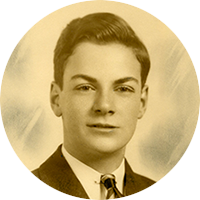
Richard Phillips Feynman was born in New York City in 1918 and grew up in Far Rockaway, Queens. He attended the Massachusetts Institute of Technology as an undergraduate, and he received his Ph.D. from Princeton University. In 1942 he married his high school sweetheart, Arline Greenbaum, despite the fact that she was ill with tuberculosis. That same year Richard was asked to join the Manhattan Project; he accepted and went on to become a group leader at Los Alamos, New Mexico. Arline died in 1945. After the war, he became a professor of theoretical physics at Cornell University in Ithaca, New York. In 1950 he joined the faculty of the California Institute of Technology and spent the remainder of his career there. He had a brief marriage in the early fifties to Mary Louise Bell that did not work out. He married Gweneth Howarth in 1960. Their son Carl was born in 1962, and their daughter Michelle was born in 1968.
Many consider him to be the father of nanotechnology for two prizes he offered in a 1959 talk entitled, “There’s Plenty of Room at the Bottom,” where he prompted thinking on a very small scale. He offered a prize for the world’s smallest motor, and another challenge involving very small writing; so small that the text of the Encyclopedia Britannica could be contained on the head of a pin. The prize for the motor was claimed almost immediately, but the challenge of the writing wasn’t met for over 20 years. Between 1961-3 Feynman gave a series of lectures on introductory physics for freshmen and the following year, sophomores, at Caltech. The series was edited and published as The Feynman Lectures of Physics, which is thought to be the most popular physics book ever written.
His most public achievement came in 1965, when he won the Nobel Prize in Physics, sharing it with Julian Schwinger and Shin’ichiro Tomonaga for their independent work in quantum electrodynamics. In 1986, he was again in the public eye, this time working on the commission investigating the explosion of the Challenger space shuttle. He died in 1988 after a long battle with abdominal cancer.